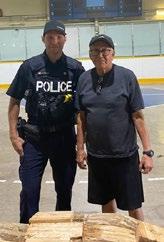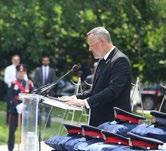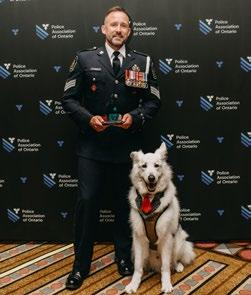THE DISPATCH


29



29



The Dispatch SUMMER 2024
Facebook: PoliceAssociationofOntario
Twitter/X: PoliceAssocON
LinkedIn:
Police Association of Ontario
Email: communications@pao.ca
General Inquiries: 416-487-9367
Advertising Inquries: 1-800-210-8579 Ext. 8007
PAO Staff
President: Mark Baxter
Executive Director: Tyler Callaghan
Communications Specialist: Heather Hogan
Events and Member Services
Manager:
Ashley Bain
Executive Assistant: Annika Vassallo
Magazine Team
Editor:
Heather Hogan
Copy Editor: Sibernie James
Designer: Beatriz Zanini
Advertising Sales: iMarketing
PAO Board of Directors
President: Mark Baxter (Brantford)
Chair: Tim Reparon (Waterloo Regional)
Uniform Directors: Cameron Gough (Kingston)
Colin Woods (Thunder Bay)
Matt Jotham (Guelph)
Mike Adair (OPPA)
Civilian Directors:
Anne Brennan-Walsh (Belleville) Jim Mulligan (Hamilton)
Director-at-Large: Becky Verreault (Halton)


Since we last spoke, the Police Association of Ontario (PAO) and our policing community have reached significant milestones, marking our collective journey with solemn reflection and determined progress. In this issue of The Dispatch magazine, we explore these critical moments.
It was a humbling experience to be among the hundreds of police personnel who attended the inaugural Ontario Police Suicide Memorial, held at Queen’s Park Crescent in Toronto on June 23. We gathered to honour the memory of the brave men and women who, despite their struggles, served our communities with unwavering dedication and courage.
I was honoured to speak on behalf of police associations about the importance of this memorial to honour the brave courageous ones whose lives were lost to mental illness and to support their families. This is a reminder of the work still needed to reduce stigma and ensure that our members know that asking for help is a sign of strength, not weakness.
The memorial was proudly supported by the Police Association of Ontario, fellow police associations and leaders and a testament to their commitment to the families, friends, and colleagues of the lost police members and letting them know that their loved ones and their sacrifices will be never forgotten.
In April, Ontario witnessed a historic overhaul of its 34-year-old law governing policing with the introduction of the Community Safety and Policing Act (CSPA). This landmark legislation resulted from extensive efforts and engagement with multiple governments, ministers, and stakeholders. The Police Association of Ontario has been a critical player, serving as the most consistent, involved, and influential stakeholder at the government table. We go into detail about what the new Act means for you.
In May, we held our association’s 92nd Annual Meeting and Convention, where members from across Ontario convene to discuss critical issues, share best practices, and strengthen our collective resolve. Thirty-five associations met in Windsor this past May. I am proud to have been re-elected for a second term as President, a role that honours a longstanding tradition which underscores the unity and strength of our membership. This tradition reflects our commitment to advancing the interests of our members and upholding the proud legacy of policing in Ontario.

During the annual meeting, we held an awards banquet where we recognized outstanding civilian and uniform police personnel throughout the province with our ninth annual Police Services of the Year Awards. Hundreds of Ontarians nominated police heroes in their local communities, celebrating the outstanding personnel who have gone beyond the call of duty. You can read more about this year’s winners on pages 44 to 48.
During PTSD Awareness Month, all month long in May, we discussed how PTSD impacts our members, the quiet struggles of their families, and how members support each other. We continue to have these conversations, which are reflected in this issue of The Dispatch magazine. We spoke with Lindsay Police Association President Ryan Boutin about their association’s creative solution for bringing more mental health services to their members – they have partnered with Wounded Warriors Canada.
PTSD not only affects first responders, but also their families. In our conversation with John and Tina Renaud from London, they shared their personal
experiences of how PTSD has altered their family. Their story is a heartfelt journey they hope will support other families facing similar challenges.
Have you ever wondered what inspires someone to run for their local police association as an elected representative and give back to members? We spoke to Lorena Mills, a director with the Waterloo Regional Police Association, about
ensuring that every member’s voice is heard and valued within the association.
As we delve into these topics and more, we are immensely proud of our members for their unwavering dedication ensuring the safety and security of their community. The Police Association of Ontario remains steadfast in our commitment to support you every step of the way. Enjoy your summer.
I wish you all a safe sumer and hope each of you has an opportunity to take some time away from work to decompress and spend time with family and friends.
In unity, Mark Baxter













Jan. 11
Provincial investment announcement re: bail reform
The Police Association of Ontario attended the Ontario government’s announcement of a $24 million investment over three years to prevent repeat and violent offenders from committing serious crimes while on bail. The investment is part of the province’s community protection plan.
Jan. 23-24
Winter Membership Meeting
Our 45 member associations attended the Winter Membership Meeting in Hamilton.
Feb. 1
Police Services Hero of the Year Award campaign
The Police Services Hero of the Year Award nominees campaign launched Feb. 1 and ran until March 18.
Feb. 13-16
Advancing WE in Policing Conference
The conference featured PAO President Mark Baxter on a panel discussing how to assure effective executive police leadership.
Feb. 14-16
Executive Member Workshop
We welcomed newly elected association board members to our Executive Member Workshop.
Feb. 26-28
2024 Employment Conference and CSPA Summit
The Police Association of Ontario hosted the Employment Conference, with over 400 people attending and over 700 attending the CSPA Summit. It was rewarding to see so many of our members engaging in dialogue with each other and members of senior command and police services boards about the important changes happening in policing.
Mar. 15
Ontario Police College graduation
We celebrated the graduation of 494 new recruits.
Mar. 19-20
CIPSRT 2024 Symposium
The symposium showcased Joint Efforts to Support the Wellbeing of Public Safety Persons. The Police Association of Ontario pointed out that no senior leaders from the police service were present.
Apr. 1
New CSPA
The Community Safety and Policing Act took effect.
Apr. 5
Provincial funding announced for mental health services
The Ontario government announced that it will provide more than $3M for mental health services to the families of public


safety personnel who died in the line of duty or by suicide.
April 9-10 Grievances Workshop
Our members participated in the Grievances Workshop with expert presenter Katie Rowen from Ursel Phillips Fellows Hopkinson LLP.
Apr. 29 – May 1
Canadian Police Association
2024 Legislative Conference
We engaged with MPs and Senators to reinforce our mutual dedication to community safety. Discussions highlight the crucial need for evidence-based strategies to address key issues like recruitment.
May 5
Ontario Memorial Foundation Ceremony of Remembrance
Our members attended the ceremony to pay tribute to Ontario’s fallen police officers who died in the line of duty. The following names were added to the memorial wall: Sergeant Eric Mueller, OPP Russell County Detachment 2023; Detective Constable Steven S. Tourangeau, Perth County OPP 2023; Chief Edward Lavery, Prescott Police 1928; and Detective Sergeant Thomas A. Whitelaw, Metropolitan Toronto Police 1938.
May 28-30
92nd Annual Meeting and Convention
We held our 92nd Annual Meeting and Convention in Windsor. It was hosted by the Windsor Police Association, and more than 150 members from 25 Ontario police associations attended. On May 29, we hosted our inaugural Presidents’ Award Dinner, where deserving police personnel received the Police Services Hero of the Year Award, the Dennis R. Latten Award, and the Harry DeJong Award for Association Service.
June 23
Inaugural Ontario Police Suicide Memorial
Our members attended the first inaugural Ontario Police Suicide Memorial where members who died by duty-related suicide were honoured.
June 24
3rd Annual Police Association of
Ontario Charity Golf Tournament
We hosted the tournament at Lionhead Golf Club in Brampton, which raised over $15,000 for Boots on the Ground and Wounded Warriors Canada.
Oct. 8-10
Advisory Council of Presidents and Civilian Conference
Nov. 19-21
Fall Membership Meeting and Advocacy Day
Dec. 3-4
Bargaining Workshop
































By Heather Hogan
First responders, including our police personnel members, put their lives on the line for the safety of Ontarians every single day. They are exposed to both physical and psychological trauma, which increases their risk of developing post-traumatic stress disorder (PTSD) or an occupational stress injury (OSI).
Although employee wellness is primarily the employer’s responsibility, our members and their families often rely on not-for-profit and other external organizations for support during their darkest days. Wounded Warriors Canada is one such organization, and partnering with them ensures our members receive critical mental health support when it’s needed most.

Wounded Warriors Canada helps members and their families face psychological challenges
The Lindsay Police Association and the Kawartha Lakes Police Service join the more than 170 Trauma Exposed Organizations across the country who have partnered with Wounded Warriors Canada. This partnership is a testament to our members’ commitment to supporting
each other’s mental health and well-being. The national mental health service provider uses clinical best practices and evidence-based care to help Canada’s Veterans, first responders, and their families at no cost.

The Kawartha Lakes Police Service and Lindsay Police Assciation are partnering with Wounded Warriors Canada to support its members and their families.
Ryan Boutin, president of the Lindsay Police Association (since 2022), describes these partnerships as vital to small associations like his, which has 75 members. They add a layer of support to his members and their loved ones.
“I’ve seen firsthand the effects of operational stress on our members. Those members show up 24 hours a day, seven days a week, to keep our community safe. Just because we’re a smaller service, we’re not immune to those effects,” says Ryan.
“Often, given our smaller size, we must find creative ways and solutions to address challenges such as member health and wellness. So, this partnership is


a progressive and valuable tool in our toolbox to help build a strong foundation of mental health support for our members.”
Membership involvement helps prioritize mental health advocacy
Ryan thinks it is vitally important for members to be engaged with their union. While association work often gets the most attention during contract negotiations, they are always involved in other critically important issues. This includes securing more mental health support for their members, a priority exemplified by the Lindsay Police Association.
“It’s been an eye-opening experience to see how much work is done daily to ensure our members are well represented. I’ve often seen this as part of a policing career, and I have so much respect and gratitude for people who choose to engage in association work and dedicate their time.”
24 Hours of Heroes annual fundraisers, years of mental health support
Ryan connected with Wounded Warriors Canada two years ago following the suicide of fellow police officer Mike Broderick in November 2021. “For a small police service, losing Mike because of the line of duty was devastating and, to this day, has long-lasting impacts on our members and this community,” Ryan says.
A week after Mike’s death, Ryan’s partner participated in a fundraising event called 24 Hours of Heroes to support Ryan during this tumultuous time. This community-based fitness event began in 2016 and raises funds and awareness for veterans and first responders living with operational stress injuries through a partnership with Wounded Warriors Canada. “When I saw the event and how the community came together, that was part of my drive to do something like that for Mike to positively
remember him.”
He followed up with 24 Hours of Heroes founder Gord Hicks and his team to create a workout dedicated to Mike. They included it in their workout lineup the next year. Association members rallied behind the fundraising event to raise money for mental health services. It quickly became an annual tradition. Today, they continue to take part in it to honour Mike, while supporting the organization which provides much-needed mental health services for veterans and first responders.
The Association sought a way to support its members’ mental health and wellness in their daily lives. Inspector Tom Hickey who is also part of the Health and Safety Committee, brought forward training available through Wounded Warriors Canada to the Service. “It was around the same time I met Wounded Warriors Canada’s Executive Director Scott Maxwell at the Police Association of Ontario’s Civilian Conference that I learned more about their amazing programs. I wanted to support them as much as I could.”
For Scott, partnering with first responders and the military is about providing ‘the right care at the right time’ for those safeguarding our communities.
“Given the complexities of operational stress injuries, we know that no single organization can provide 100% solution when it comes to the mental health and wellness needs of its members and their families. Partnerships are vital. Together, we are working to break down barriers to accessing culturally appropriate mental health care while reducing stigma for those who serve. We’re grateful for their willingness to collaborate, and we look forward to working with the Lindsay Police Association in the months and years to come.” – Scott Maxwell, Executive Director, Wounded Warriors Canada
Get the culturally specific training and counselling support you need: Trauma Resiliency Program, COPE program, Couples Resiliency Program, Surviving Family Program, Warrior Kids Camp and Virtual program, PTSD service dogs, and Operational Stress Intervention dogs
Eleven years ago, Wounded Warriors Canada was established as a charitable foundation to help fund third-party mental health initiatives for Canada’s military, particularly for those struggling to transition to civilian life after serving in Afghanistan. In 2015, with a desire to become a direct mental health service provider, the organization developed a couples-based group trauma program called COPE: Couples Overcoming PTSD Everyday. They never looked back and have gone on to develop and deliver 16 national training and counselling programs to support the unique needs of Trauma Exposed Professionals and their families.
In 2016 Wounded Warriors Canada expanded its mission to include First Responders and their families, which was a milestone moment in the organization’s history as it led to the development of the Before Operational Stress (BOS) program.
Ryan talks about the impact of trauma on a small service like his, “we are like family.” This is why it is even more difficult for members to access resources close to home; they want their privacy.
“Nowadays, we see significant enhancements in benefits for psychological services, which provide people with more flexibility to access services outside their local area. Thanks to technology, individuals can receive services from the comfort of their homes. A major shift in which Wounded Warriors Canada
excels is the expanded focus beyond the individual member – they recognize that the impact also extends to their families. Consequently, there are specialized programs designed to support spouses and couples who may be facing challenges.”
At the association level, Ryan says that advocacy is vital because of the stigma that still surrounds operational stress injuries. The stigma is lifting, but slowly. “Sadly, many members feel like they are not worthy of getting treatment and still believe they need to experience some unimaginable traumatic event for them to be worthy of getting help. As a result, too many of our members suffer in silence.” Ryan’s hope for new members joining the Service is that “knowledge is power.”
“I’m hopeful that nurturing a policing culture that values and prioritizes good mental and physical health will develop early on in our members’ careers.”
Overcoming the stigma surrounding mental health remains the biggest challenge for our members. However, local associations across the province are prioritizing mental health in their collective agreement negotiations by advocating on behalf of their members to the provincial government and various stakeholders. Like the Lindsay Police Association, they are also finding innovative ways to provide essential mental health services for their members, such as partnering with Wounded Warriors Canada.
For more information on Wounded Warriors Canada, visit woundedwarriors.ca






Mitch Dumont
By Heather Hogan
Constable Mitch Dumont, the first Indigenous Liaison Officer at the Niagara Regional Police Service, has been on a personal journey of discovery regarding his Indigenous identity. Discussions about this topic were rare in his family. He knew of his grandfather’s Algonquin (Anishinaabe) roots and his birth on a reserve in Quebec. Yet his ancestors’ cultural heritage and traditions were not a significant part of his upbringing.
“I’ll say that because I think many Indigenous people deal with this. I don’t look Indigenous – my mom’s white. My dad’s side has the First Nations’ background, but my family didn’t discuss it.”
Mitch believes that the reluctance to discuss his family’s Indigenous heritage stems from several key factors rooted in Canada’s colonial past, such as residential schools, stigma and discrimination, government policies to repress Indigenous identities, and urbanization and relocation. They all contribute to his Indigenous worldview and ways of knowing.
“I always knew I was Indigenous growing up, but it’s only been in the last decade that I’ve been able to find a community, participate in ceremonies, and have meaningful conversations about my heritage.”
Mitch’s journey of selfdiscovery and community connection
As Mitch’s career path to law enforcement progressed, he found himself on a parallel path of self-discovery, embracing his Indigenous heritage. This journey, which began with a personal interest, soon became a professional one as he recognized the significance of his heritage for his work. This exploration enriched his identity and influenced his approach to policing, fostering a deeper connection with the communities he serves.
Mitch has been with the Niagara Regional Police for eight years, starting with general patrol and spending two years with the Community-Oriented Response and Engagement Unit within 1 District, which includes St. Catharines and Thorold. Most recently, he was

promoted to the role of Indigenous Liaison.
Eagle feather symbolizes a connection and a demand for truth
At the Ontario Police College, Mitch befriended an Ontario

Provincial Police officer with a similar background and experience. This friendship provided Mitch with someone he could relate to, strengthening his interest in discovering his identity and heritage. His journey of selfdiscovery began with a significant milestone: using an eagle wing during his swearing-in ceremony when he joined the service.
The eagle feather, a revered symbol in Indigenous culture, holds a deep significance. The eagle, believed to fly the highest and closest to the creator, symbolizes a connection and a demand for truth. Mitch did not lose sight of this symbolism during his swearing-in ceremony.
Mitch likes to “fly under the radar,” so asking to take his oath using an eagle feather was tough because he didn’t want to draw attention to himself. However, he believed strongly in asking for this specific ceremony. “The eagle feather within Indigenous traditions and cultures is a significant and sacred symbol. My swearing-in was done with an eagle wing, although it can also be done with a single feather. It was something I strongly believed in. If I was going to make an oath, it was important to do it by my beliefs and traditions.”
Barriers to services, overrepresentation of Indigenous people in criminal justice system
Mitch admits that he has a lot to learn. When asked why he decided to become a police officer, he replied, “The biggest deciding factor was doing something my family could be proud of.” He was the first in his family to go into policing, and his brother Cory followed and is now working for the RCMP.
But now that he’s in the profession, it’s “hitting him harder,” seeing the barriers and overrepresentation of Indigenous people in the criminal justice system. “I started to go down that path of trying to break down some of the barriers, maybe learn more about the history, and then educate myself on these issues.”
Niagara has no reserves but a large urban Indigenous population, especially in Fort Erie. In 2021, according to Statistics Canada, 13,960 persons identified as Indigenous in the Niagara Region, representing three per cent of the region’s population, and they reflect many different nations. But that number is does not reflect those who have not identified as Indigenous, so the numbers, is likely to be higher. Niagara Region has two Friendship Centres: Fort Erie Native Friendship Centre and
Niagara Regional Native Centre. Mitch was formally on the Board of Directors for the latter.
Indigenous distrust of police, fear of unfair treatment
Mitch says that when he works with the Indigenous population, many of them do not like to self-identify as Indigenous when dealing with the police. He talks about the distrust of police in the community. “I think it’s a huge barrier because there are a lot of programs out there that can help them. They are not getting access to these programs because they are not identifying themselves as Indigenous. I think there’s a fear of not being treated fairly if they do identify.”
When Mitch started on patrol, he knew he was connected to the Indigenous community, and his job allowed him to be more active in it. He wanted to contribute more to the community so he transitioned to the Community-Oriented Response and Engagement Unit. He feels compelled to contribute to his community, a feeling he cannot quite express, but he knows “it’s really important.”
When a member of the Indigenous community has had a negative experience with the police, Mitch makes sure he makes the time to
speak with the person after the interaction, to be someone they can talk to and who will listen to them. Sometimes, this involves Mitch explaining the situation and providing education or access to resources, because the person is more comfortable speaking with him than with the officer they dealt with at the time of the incident.
Mitch engages with students, builds their trust
Mitch enjoys engaging with the community and attending events. He also spends much of his time at Soaring Eagles School, supporting a program run by the Niagara Regional Native Centre and Niagara Catholic District School Board. The school is set on forested property owned by the Niagara Peninsula Conservation Authority. About 30 students from all grades across the region come to learn. They follow the Ontario curriculum, paying extra attention to outdoor activities.
When he first began visiting the school, he did not go in uniform but in plain clothes so as not to create fear or intimidate the students, especially those who may have had a negative experience with the police. Gradually, he gained their trust and can now show up in uniform.
Eliminating barriers and misconceptions, bridging the gap between police and Indigenous people
“Being an officer isn’t who I am. This is what I do, and that’s building that trust.”
This dedication to bridging the gap between the police and the Indigenous community is one of the many reasons Jessica Riel-Johns, former Co-Executive Director of the Niagara Regional Native Centre, nominated Mitch for a Police Service Hero of the Year award.
“Mitch goes above and beyond to connect his community and members of his police service to bridge the misconceptions around Indigenous people and police services, by connecting and partnering with Indigenous organizations so that community members are receiving the proper support while eliminating barriers and misconceptions.”
Jessica continued, “Mitch is an outstanding leader in his community for anyone from youth to elders. As an Indigenous leader of the Niagara Region, I’ve never felt the closeness of our partnership that Mitch was able to help create within his community, and the sense of safety community members have in the presence of Mitch and Niagara Regional Police Service.”
Jessica says she has watched him grow from his journey and how he connects with the community. People respect him no matter who he interacts with, and she cites that when people need to provide a police report, they specifically request Mitch because they trust him.
Niagara Regional Police Service appoints Mitch their first Indigenous Liaison Officer
This crucial step for the service shows that they value the work Mitch has been doing with the Indigenous community, and how vital that work is for the community as a whole.
Mitch says that building trust through these crucial relationships comes down to “just listening.” He says the service is moving in the right direction to bridge the gap between the police and the Indigenous community.
“But it’s not going to happen overnight, and that’s something that I’ve been seeing a lot through the community recently: These changes take time. I think it is a big mountain because there’s a lot of a lack of trust there, and it takes time to build trust in relationships.”




Lorena Mills
By Heather Hogan

Within the Police Association of Ontario, our members are committed to service beyond duty. Lorena Mills, a civilian director at the Waterloo Regional Police Association, exemplifies this dedication with more than 21 years of service.
She was born and raised in Sault Ste. Marie by Italian immigrant parents. After attending Laurentian University in Sudbury, she moved out west then returned to Ontario to settle down in Cambridge.
What motivates Lorena Mills to give back to her fellow members?
For Lorena, it’s a commitment to community and a desire to meaningfully contribute to
advancing her colleagues’ rights, interests, and well-being. Her journey began with a passion for supporting those safeguarding our communities, evolving into a dedicated effort to ensure every member’s voice is heard and valued within the association.
Lorena Mills is humble. She prefers to let her actions speak for themselves. Since joining the records department in July 2003, she has held diverse roles – from Dicta-typist to Occurrence Clerk, Canadian Police Information Centre (CPIC) Operator, CPIC Auditor/Validator, Court Dispositions Clerk, Front Desk Clerk, and now as Case Preparation Clerk . Her journey into public service began with a simple job application and has been defined by unwavering dedication.
Fostering a sense of unity and shared responsibility
Lorena is not just a dedicated professional but also a devoted mother. When she embarked on her career, her children – a 27-year-old daughter and a 24-year-old son – were six and three years old, respectively. As a single mom working shifts, It was important for her to volunteer on Parent Council at her children’s school and volunteer with her son’s Cambridge 21 Army Cadets
Corps. Lorena faced the challenges of balancing a demanding career with parenthood, all without the support of a nearby family.
Her time spent with the association is a testament to the power of encouragement and the value of active participation. It all began with the support of a colleague who introduced her to association meetings. Initially uncertain, Lorena quickly recognized the importance of these gatherings and has since attended for over two decades, a journey that many of us can relate to and be inspired by.
“So, I went out to my first meeting, and I’ve been faithfully attending association meetings ever since. In the 20-odd years I’ve been there, I can probably count on one hand how many meetings I’ve missed.”
Lorena’s approach highlights the value of engagement and knowledge-sharing within the association. Encouraging others to attend and participate fosters a sense of unity and shared responsibility among members.
Association stepped up to help Lorena when she needed it
In 2020, when an opportunity for a civilian director position came up, she ran against three members
and did not win the first time. “There were three of us running, so I ran against two others, with one being a past/former civilian director.”
“I went to all the specialty branches and encouraged people to join the association. ‘It’s your association. We own it. Get out there and use it.’”
But in 2022, she ran against an incumbent and won. When asked why she thought she was successful the second time, she replied that it was due to hard work.
“I’ve always wanted to be on the board, but with two young kids, I could not spare the time, and when I chose to volunteer, I wanted to devote my complete time and attention.”
Since her kids are in their twenties, she has more time to focus on herself than you would think, but instead, she focuses on her members. “I’ve just always been a supporter of the association.”
Advocating for rights and interests of association members
There was a time when Lorena needed the association’s support,
and they were there for her. “I know from firsthand experience that these situations are stressful and can question your testament, beliefs, values and career choice, but I have been there, and you can get through this situation. The Association does a lot of work behind the scenes. You must trust the experts and the process.”
Lorena calls herself a ‘mama bear’ because she doesn’t want her fellow members to be pushed around. She is always ready to step in and advocate for their rights and interests, ensuring they are treated fairly and respectfully.
Her commitment to the Association and its members is unwavering, and she is always looking for ways to improve and strengthen it. Because she’s been at the Service for over two decades, she can quickly reference the collective agreement because she has read it. She encourages new members to do the same.
What types of things does Lorena help her members with? She is a constant source of support and guidance, addressing many questions about overtime, holiday signing, and training when the
staff is too short-staffed. She is dedicated to ensuring her fellow members’ concerns are heard and addressed.
She doesn’t like to leave her members hanging and gets back to them as soon as possible. “They have concerns, and you must let them know immediately just to ease their minds.”
“We pay our dues like everyone else.”
When asked about member mental health and wellness, Lorena says that sometimes civilian members don’t feel as supported as uniform members. It’s like they always say –“everything about the uniform.”
If you go by the numbers, there are more uniform members. But that doesn’t deter Lorena; she forges on and continues to ensure civilian members’ voices are heard at the table because “we pay our dues like everyone else.”
Lorena encourages new members to join association meetings. “You have nothing to lose by getting involved. You’ll find it rewarding if you do. You may even like it so much that you’ll want to become a director to help others, too.”

On April 1, 2024, Ontario witnessed a historic overhaul of the 34-yearold Police Services Act with the introduction of the Community Safety and Policing Act (CSPA). This landmark legislation is the result of years of extensive consultation and engagement with multiple governments, ministers, and stakeholders. The Police Association of Ontario (PAO) has been a key stakeholder and advocate throughout this process, serving as the most consistent, involved, and influential stakeholder at the government table.
The Act represents a significant achievement in our collective mission to protect and advance the rights, interests, and wellbeing of our professional police personnel who tirelessly work to keep our communities safe. While this is a major milestone, our work is far from complete. The PAO will continue to advocate for necessary improvements to the Act and Regulations, and will play a significant role as our workplaces transition to the new framework.
However, many frontline police personnel, whether uniformed police officers or special constables, might be wondering what this new Act means for them. In this article, we will break down the journey to this historic change and outline key
takeaways about the Act that you need to know.
The Long and Winding Road to the CSPA
The road to the CSPA was paved with years of consultations, negotiations, and unwavering commitment from the PAO and its members. The process involved engaging with various governments and ministers, advocating for the needs and concerns of police personnel, and ensuring that the voices of those on the frontline were heard and addressed.
Since 2016, we have worked every single week to advocate on your behalf, in collaboration with the Ontario Provincial Police Association and the Toronto Police Association. This included three comprehensive submissions in 2016, 2018 and

2019; hundreds of letters; and well over 400 meetings.
Key Takeaways of the Act
1. Enhanced Community Safety: The Act aims to improve community safety by implementing modern policing practices and ensuring that police services are better equipped to respond to the evolving needs of our communities.
2. Strengthened Police Accountability: New measures have been introduced to enhance transparency and accountability within police services, fostering greater public trust and confidence.
3. Support for Police Personnel: The Act includes provisions that focus on the well-being and professional development




Previous Interim Inspector General of Policing and Deputy Inspector General Kenneth Weatherill and Executive Director, Indigenous Police Chiefs of Ontario, Chief Kai Liu.
of police personnel, recognizing the critical role they play in maintaining public safety.
4. Improved Collaboration: The legislation encourages stronger collaboration between police services and community partners, promoting a more integrated approach to community safety.
5. Adaptation to New Challenges:
The Act provides a framework that allows for flexibility and adaptation to new challenges and emerging issues in policing.
As we move forward, all members must stay informed about the changes and understand how the new Act impacts their roles. The PAO is committed to providing ongoing support and guidance during this transition period.
Positive changes for police workplaces
The PAO was largely successful on all fronts, including unpaid suspension which has been mitigated significantly against what had been initially proposed. Gains have been numerous and noteworthy, including full independent adjudication of discipline matters, independent oversight of police service boards and chiefs, and a revamped officer code of conduct that will limit
abuse by chiefs.
Over the last decade, hundreds of people have influenced and had a hand in developing the CSPA. People from different stakeholder groups, often with opposing perspectives, worked diligently in partnership to improve the Act, with the ultimate goal of making positive changes to police workplaces. And we can confidently say, and say proudly, that this Act and the modifications in it will do exactly that.
We encourage you to reference the entire Act and regulations which can be found at www.ontario.ca/ laws/statute/19c01. But here’s a summary of the Top 10 policies of the CSPA:
1. Police Service Board’s Role:
The Act emphasizes the crucial role of police service boards, placing the responsibility for providing adequate and effective police service on the boards rather than on the municipalities.
2. Labour Relations: The Act makes minimal changes to the labour relations framework, with Section 220 allowing for the limited disqualification of certain workers from association membership.
3. Police Officer Misconduct: The Police Officer Code of Conduct has been rewritten. The Law Enforcement Complaints Agency (LECA) replaces the Office of the Independent Police Review Director (OIPRD) but retains a similar role.
4. Independent Adjudication:
The Ontario Police Arbitration Commission is now the Ontario Police Arbitration and Adjudication Commission, overseeing both arbitration and adjudication, aiming for fairer and more transparent police discipline.
5. Suspension Without Pay:
Chiefs of police now have expanded authority to suspend officers without pay during misconduct investigations, although the Act is unclear about back pay if termination does not occur.
6. Special Constables: Special constables’ roles are preserved with a focus on supporting sworn officers rather than performing primary policing functions. A new code of conduct is established but does not impose additional disciplinary obligations.
7. Whistleblowing: The Act mandates policies for reporting misconduct and creates a framework for internal
whistleblowing, ensuring that both officers and special constables report misconduct appropriately.
8. Adequacy Standards and Inspector General of Policing: The Inspectorate of Policing (IOP) replaces the Ontario Civilian Police Commission (OCPC) to oversee and ensure police service boards meet adequate and effective policing standards.
9. Conflicts of Interest: New regulations address personal and institutional conflicts of interest, ensuring police members act appropriately when faced with such
10. Transitions: Certain elements of the previous Police Services Act will remain in effect for ongoing cases, with existing misconduct investigations continuing under the old system until resolved.
In February, the PAO, in collaboration with the Ontario Association of Chiefs of Police, Ontario Association of Police Boards, and Ontario Senior Officers’ Police Association, brought together policing partners from
across Ontario to ensure that the information in the Act and associated regulations would be known, shared and discussed.
The conference highlighted key changes to the policing framework, bringing together associations, boards, and chiefs of police, and featured sessions delivered by industry experts. It also promoted a shared understanding of the CSPA and the impacts of specific changes on police services of various sizes. Attendees came away well informed.



On Sunday, May 5, the Ontario Police Memorial at Queen’s Park witnessed a solemn yet heartfelt tribute as four police officers’ names were added during the 25th annual Ontario Police Memorial Foundation Ceremony of Remembrance.
The Police Association of Ontario stood shoulder to shoulder with thousands of Ontario police service members to honour the service and sacrifice of those who have died in the line of duty.
“Today marks the 25th anniversary of the Ontario Police Memorial Foundation Ceremony of Remembrance,” said Jason Tomlinson, president of the memorial foundation. “Our annual gathering at Queen’s Park is a stark reminder of the cost of safer communities. Although it is a time of reverence and reflection, it is also a time of support and love.”
Joining the 281 names of commemorated officers, four new names were inscribed on the Wall of Honour:
• Sgt. Eric Mueller , Russell County OPP detachment Mueller, a 42-year-old father of two, was shot and killed in May 2023 while responding to a call outside of Ottawa.
• Det. Const. Steven Tourangeau , Perth County OPP detachment Tourangeau also died in May 2023, less than three weeks after Mueller’s death, in a collision with a school bus.
• Const. Chief Edward Lavery of the Prescott, Ontario police force died in 1928.
• Det. Sgt. Thomas A. Whitelaw of the Metropolitan Toronto Police died in 1938.
Remarks shared at the ceremony commemorated not only the bravery of the fallen officers for their service but also their
memories as fathers, brothers, husbands, and sons.
Mueller joined the OPP in 2002 as a special constable responsible for transporting offenders in Ottawa. He was officially hired as a recruit in 2006 and was promoted to sergeant in 2018. Described as kind and compassionate, Mueller was a role model to all in his community and fondly remembered as a family man devoted to his wife and two children.
Tourangeau , an eight-year veteran of the OPP, whose call to duty predated his swearing-in as a special constable volunteer, had a cheerful disposition and an ability to build trust in his community. He will be remembered as a loyal husband, father, and friend.
Several families of fallen officers attended the ceremony, joined by a large contingent of police officers and civilian members.

Dignitaries who were present to honour the fallen included the Lieutenant Governor of Ontario, The Honourable Edith Dumont; the Premier of Ontario, The Honourable Doug Ford; Solicitor General, The Honourable Michael Kerzner; and Toronto Mayor Olivia Chow.
Premier Doug Ford spoke at the event. “Each spring I stand here in front of this monument, and I pray that not one more name be added to this memorial,” Ford said. “I pray that every single one of Ontario’s finest makes it home safely at the end of their shift.”
We cherish these officers’ memories but know their loved ones are left behind feeling their absence. They will never be forgotten. Our members will always stand with the brave men and women who put their lives at risk every day for the safety and protection of Ontarians.

At Amica Whitby, each day is yours to spend exactly as you wish. Dine when you want, relax how you want, and celebrate whatever you want. Together we’ll create a senior living experience that’s all yours, including personalized, professional care that meets your needs, even as those needs change. And, like making up your own rules, that never gets old.
Join us for a complimentary lunch and private tour.

By Heather Hogan

Post-traumatic stress disorder (PTSD) casts a long shadow over not just the lives of first responders but also their families. This reality hits home for Tina Renaud, whose husband, John Renaud, has amassed 34 years of service between the military and policing. For John, like many in his line of duty, recognizing and addressing PTSD has been a journey marked by years of silent struggle.
It took time for John to acknowledge its presence and seek the help he needed. Tina Renaud,
deeply invested in supporting her husband and understanding the toll PTSD was taking on their family, has become an advocate for raising awareness about this oftensilent battle.
Along the way, Tina and John Renaud have exemplified the courage it takes to not only face the challenges of PTSD, but also to discuss its impact on their lives openly. Their story underscores the importance of support systems within first responder communities and beyond.
A string of calls led to John’s undiagnosed PTSD
Tina and John met in the Canadian Armed Forces. Tina was released from the military and stayed at home with their first son. Then, they both moved to London, where their second son was born, and John joined the London Police Service. After eight years as a stayat-home mom, Tina returned to work in the Naval Reserve Division HMCS PREVOST. It was around this time that John had a string of calls that led to undiagnosed PTSD before ‘the chickens came home to roost’ and John started to get treatment.
John describes his journey with PTSD as non-linear, having returned to work twice. This last time, he’s been back to work for two years, and things are getting easier because retirement is just around the corner.
Communication alleviates fear, builds support and understanding
Their sons, now young men aged 26 and 23, have grown up witnessing their father’s battle with PTSD. This has given them a firsthand understanding of their family’s challenges. Their awareness underscores the ripple effects of PTSD within first responder families, emphasizing the need for ongoing support and understanding.


“We wrestled with communication when John was struggling, and we’re finding our way back to that now,” said Tina. “One of the challenges many couples with PTSD in their home face is the fear of rocking the boat, the fear of saying something wrong. It could all be resolved with communication if we just asked the hard questions. But amid it all, that’s a tough thing to do.”
John’s self-isolation and Tina’s altered approach to talking with him
John says he knew something was wrong, but he avoided and buried it instead of dealing with it. For many years, Tina bore the brunt of that. Some things were just too hard to tell Tina, and it took hard work and treatment to disclose these things to her.
Tina noticed that John had become very isolated. He stayed home and avoided public spaces and strangers. Tina has learned to adjust her communication. because even now, if Tina opens with ‘Do you want to?’ John already has a ‘no’ in his head. The question leads to an immediate shutdown.
So now she tries a different approach. For example, if she wants to suggest going to a concert or special event, she might say, “I read about this show that’s coming to London; it’s played in a few places.”
She plants the seed first before the pressure of asking, “Do you want to go outside?”
“What happened? What do you need?”
Amid raising teenagers, full-time jobs, and John’s undiagnosed illness, communication posed a challenge. Passing by each other daily – John returning home as Tina left – necessitated a note system for tasks like feeding the dog and planning meals, crucial due to their shift schedules. However, notes proved superficial and deeper connection was sometimes elusive.
They learned vital communication skills through John’s therapy and Tina’s counselling. Tina reflected on this growth, stressing the importance of thoughtful phrasing in challenging conversations. “It taught me to ask, ‘What happened? What do you need?’ rather than, ‘What’s wrong with you?’ Using these questions has brought more success in our discussions.”
Personality changes, a red flag of PTSD
Tina was struggling herself, working a full-time job with two children. She ignored many of John’s behaviours, and John became good at covering them up. John and Tina speak of some red flags to look out for – such as a personality change.
“Policing is a job that will change your outlook and disposition –mine certainly changed,” says John.
His family found themselves walking on eggshells around him, unsure what might trigger him. These heightened sensitivities stemmed from fear, leaving John feeling increasingly frustrated. Incidents that he would have shrugged off before PTSD now tended to provoke an emotional response. Still, he wanted to keep his struggle private.
“When I first started seeing the doctor, I always told people that I was hell-bent that nobody was going to know I was in treatment except me, Tina, and the doctor.” But John couldn’t hide it when he went off work a few months later. John was ‘outed’ as having PTSD after he donated some artwork for a mental health fundraiser and wrote a hopeful message for the purchaser. His donation was posted online with him as the donor, and in John’s mind he needed to deal with ‘everyone knowing.’
John eventually realized there was little risk because there was no longer much of a line to cross.
“I really couldn’t think of who I wanted to keep that news away from because the stigma was coming off now, right? I wasn’t embarrassed by it. I knew it wasn’t something I did or did
wrong. I knew it was something that happened to me, and I was working hard to fix it,” said John. Out of the shadows
He went from living in the shadows with PTSD to publishing a book about it. John began therapy and, in time, started to express his feelings in writing. His book, A Troll in the House, tells John’s story through a character named David, who lives with a troll. The troll represents his trauma. He now sells copies and donates the proceeds to Veterans and Everyday Heroes, an organization that raises funds to buy service dogs.
“And that’s significant for us,” Tina emphasized. “PTSD shouldn’t be something we hide. I truly feel that sharing John’s story through the book and then sharing my own feelings opens the door for conversations. I’m no longer afraid of people asking me questions.”
They hope that by sharing John’s story, which is also Tina’s story, they can help someone who might be struggling with PTSD on their own.
No need to tough it out alone, talk it out instead
John describes himself as in the ‘sandwich’ generation of policing because, for the first 15 years of his career, mental health
was not something you talked about; you just toughed it out. Now, the needle is moving in the right direction, and recruits are learning more skills and accessing tools to cope with the stresses and trauma caused by their job.
“John is now advocating for himself,” said Tina. “I think that he’s an agent for change in this case. I believe that he’s making a difference.”
Tina reflects on the beginning of their journey, recognizing that initially, PTSD was John’s struggle. She acknowledges that healing from PTSD is something John had to undertake on his own, though she wished she could have done more to help him. Once John began seeking help, it opened doors for Tina to reach out to trusted individuals for support, allowing them to move forward together.
Tina rediscovers her true self, John remains a hero to his sons
Tina has undergone counselling and also accessed Wounded Warriors Canada services and a PTSD spousal group, describing them as lifesaving. She did not need to explain herself to this group; everyone was walking her path, although in various stages of it. She didn’t have to wear a mask anymore and gradually started to feel like herself again.
John was taken aback by how well his teenagers handled his PTSD diagnosis. He worried he might “no longer be the hero in their eyes,” but they responded that seeking help when something is wrong is common sense – you see a doctor. John returns to his point about being in the sandwich generation; mental health and wellness are discussed and normalized.
Tina helps recruits understand PTSD and communicate better with their families
Tina now regularly speaks to recruits and shares her experience in how PTSD affects the family and her journey while navigating that. They also receive tools on how to express themselves to their families, especially when they’ve had a ‘tough day.’
Tina describes a recruit who reached out to her and told her they went to see a therapist just to get checked for their baseline so they could keep on top of their mental health throughout their career. It’s moments like this that she feels their journey really helps people.
“I’m just trying to make my voice heard so people understand PTSD and receive information from all sides of the story.”






By Heather Hogan

The inaugural Ontario Police Suicide Memorial was the culmination of years of hard work by Canada Beyond the Blue to commemorate police personnel who died by suicide because of the line of duty. The inaugural ceremony was held in Toronto on Sunday, June 23. The names of 51 police service members were spoken aloud and will be meticulously recorded to honour their service and acknowledge their tragic loss.
“This memorial is an opportunity to honour the brave men and women whose lives were lost to mental illness and to remember how they served our communities with unwavering dedication and courage yet struggled with battles too often unseen,” said Mark Baxter, President of the Police Association
of Ontario. “We stand with their loved ones, not only to honour the memory of those lost but to acknowledge the sacrifices they made and to recognize the immense pressures they faced because of the line of duty.”
Previously, only members who were killed in the line of duty were honoured with a provincial memorial. This memorial allows families to recognize members who suffered from mental health issues that led them to take their own lives.
Dilnaz Garda, the founder of Canada Beyond the Blue, and Krystal Jones, President and Co-Founder of Toronto Beyond the Blue, played a pivotal role in bringing this memorial to fruition. She describes the journey to
establishing this memorial as incredibly long and challenging. The topic of police suicide has been a deeply divisive and sensitive issue, with many hesitant to address it openly. However, Canada Beyond the Blue trailblazed a path to ensure that the struggles and sacrifices of these members would be recognized and remembered, and their families had an opportunity to honour them with dignity.
What is Canada Beyond the Blue?
Canada Beyond the Blue is a peerled, non-profit organization with chapters across Canada. Dilnaz works to support and strengthen the families of our members. She promotes awareness of the

members’ values and helps others understand the unique joys and struggles of life in law enforcement. Our members put their lives on the line for the safety of Ontarians every day. Still, the nature of police work means they are at a heightened risk for developing mental stress injuries such as post-traumatic stress disorder (PTSD).
Mental health affected “because of” the line of duty
Dilnaz says that police personnel who die by suicide are disproportionately dying when compared to those in the line of duty, and it’s something that we should take a closer look at. She does not like to compare a plightin-the-line-of-duty death against a because-of-the-line-of-duty death. Still, she says that the latter should spark just as serious a conversation about what policies stakeholders are responsible for, to ensure that policing members are safe and taking care of themselves in this career.
A “because of the line of duty” death refers to a police member’s injury or trauma sustained during their duties, which has been determined to be a significant contributing factor in their death by suicide.
“How many careers can you say, ‘Well, because of my job, I’m at risk of developing mental health issues and dying?’” said Dilnaz. “Not many. Just like a physical altercation
from being in the line of duty is a consequence of the job, we take measures to ensure that policies and training are in place to ensure police personnel can safeguard themselves. We should be doing the same regarding mental health because it is a consequence of the job.”
First Ontario Police Suicide Memorial held in June
Provincially, the first Ontario Police Suicide Memorial took place on Sunday, June 23, 2024. In October 2023, the Ontario Provincial Police were the first police service in Canada to memorialize members that died by suicide. In May 2024 the Toronto Police Service held their inaugural suicide memorial. The Police Association of Ontario was a proud partner working with Canada Beyond the Blue to ensure that a provincial suicide memorial came to fruition.

Police Associations across Ontario are working with Canada Beyond the Blue and other mental health support organizations to break down barriers that prevent those struggling with their mental health from accessing the care and services they desperately need.
Major culture shift needed to build a community of healing
Dilnaz says she spent years trying to change the culture of talking about suicide to get to this moment. She lost her brother, Constable Darius Garda of the Toronto Police Service, in February 2016, when he took his life after battling years of mental health issues after an on-the-job shooting. He was only 29 years old. Since then, Dilnaz was determined to normalize conversations around mental health and help police personnel and their families get healthy and stay healthy.
“Honouring your loved one’s memory is everything because it gives dignity to what they did. When they were a police officer, families were proud. Why should they feel shame in their death? And so, it provides families with a sense of healing and dignity because their family member served as an amazing police officer.”
“Honouring the fallen members and their service in this way fosters a community of healing, allowing us to step out of the shadows cast

by the stigma of suicide,” says Dilnaz Garda, Executive Director, Canada Beyond the Blue. “It helps us recognize and remember our loved ones’ significant contributions during their policing career.”
“We must destigmatize mental health in policing.”
At the ceremony in June, Police Association President Mark Baxter emphasized the importance of addressing mental health within the policing community.
“We must confront the stigma that surrounds mental health and ensure that every police member knows that asking for help is a sign of strength, not weakness,” said Mark. “All of us must commit to fostering a culture of openness and understanding within our police services, where every police member feels safe to be vulnerable without fear of judgment or repercussion.”
Our members’ families can attest to their unique challenges, which necessitate education, emotional support, better awareness, training, and tools to enable them to not only survive, but thrive.
Canada Beyond the Blue supports members in crisis and their families
Although employee wellness is primarily the employer’s
responsibility, our members and their families often rely on notfor-profit and other external organizations for support during their darkest days. Organizations like Canada Beyond the Blue are on the front lines, helping our members in crisis and supporting their families. While the services of these organizations are invaluable, it cannot be the only support available.
Province to invest $3 million in bereavement counselling and therapy
In April, the Ontario government announced an investment of more than $3 million to support families of first responders and public safety personnel who are killed in the line of duty or who have died by suicide. This funding will provide free rapid bereavement counselling for up to two years following the death of a loved one.
“First responders and public safety personnel put their lives on the line for the safety of Ontario every single day,” said Solicitor General Michael Kerzner. “That is why our government is ensuring that families who experience the loss of a loved one can access critical mental health support when they need it most. This investment is a testament to our government’s dedication to protecting everyone who helps keep our province safe.”
Family members, including partners, parents, siblings, and children, can access mental health services such as crisis support, counselling, and therapy by phone or online. These services are being delivered through a three-step care model that includes:
• Professionals who provide crisis and care planning 24 hours a day, seven days a week
• Comprehensive mental health services, including rapid access to counselling
• Proactive care that supports families regardless of location or services required
Understanding mental health, sharing sadness, remembering
Dilnaz acknowledges that the policing community has made significant progress in recognizing human trauma and ensuring members have access to resources to support them. The move towards having a provincial suicide memorial is also a step in the right direction. She hopes that by connecting our policing community with the families affected by suicide, we can ensure that the family, friends, and colleagues left behind know that the policing community shares in their sadness and stands behind them. “I hope this memorial can provide families comfort in knowing that their loved ones will always be remembered, and never forgotten.”











Republished with permission from Beyond the Badge, Summer 2024 Year Issue of the Ontario Provincial Police Association Member Magazine.
By Scott Mills
Hundreds gathered on Saturday, May 11, to honour and remember OPP officer Greg Pierzchala, who was tragically shot and killed while responding to a call about a car in a ditch in Hagersville, Ontario.
Now in its second year, the memorial run raises money for a local parish and funds a high school scholarship created in Greg’s honour.
“The run helps fill the void in so many hearts following Greg’s death. His legacy continues and grows stronger every year thanks to the community that has wrapped its arms around the Pierzchala family,” said OPP Commissioner Thomas Carrique.


The community also honoured OPP officer Eric Mueller, who was killed in the line of duty on May 11, 2023. The event served as a solemn reminder of the dangers men and women in uniform face daily.
“We have faced many tragedies, and remembering Greg, Eric, and many other officers we have lost over the years is so important. We remember them not just on the wall of honour, but also in the communities they served,” said Sgt. Kerry Schmidt, spokesperson for the OPP’s highway safety division.
The 2023 Greg Pierzchala Memorial raised over $19,000 - the total raised for the 2024 event has yet to be announced.





























The Police Association of Ontario proudly announced the winners of the 9th annual Police Services Hero of the Year Awards. Hundreds of Ontarians nominated police heroes in their local communities, celebrating the outstanding personnel who have gone beyond the call of duty.
The winners were honoured during the Police Association of Ontario’s 92nd Annual Meeting and Convention in Windsor, attended by representatives from 34 local police associations across the province, exemplifying some of the exceptional individuals and teams who dedicate their lives to protecting and serving their communities.
Sergeant Scott Hunter and Call Centre Manager Sandra Lewis, York Regional Police: On-Duty Difference Maker – Uniform
(Awarded to a police officer who has gone above and beyond the expectations of the job while on-duty)
“Active Shooter, advance to contact.” This command, familiar from mass shootings like Columbine and Las
Vegas, became a grim reality in Canada on December 18, 2022 in Vaughan, Ontario.
York Regional Police (YRP) Communications lit up with frantic 911 calls from victims and witnesses of an active shooter at the Bellaria Residence condominium. One of the initial callers, a shooting victim, provided crucial details to a YRP Call Taker before succumbing to their injuries.
The YRP Dispatcher, trained for such emergencies, dispatched multiple officers, knowing the danger they faced. Officers quickly formed teams and advanced toward the active shooter, guided by sounds of gunfire or directions from victims. These officers bravely entered the building, risking their lives to save others.
The suspect had grounded the building’s elevators by pulling the fire alarm, forcing officers to split into smaller groups and use stairwells. Within four minutes, officers found and neutralized the suspect on the third floor, ending his deadly spree. They also rendered first aid to victims and continued clearing

the building to ensure no other shooters were present.
This response highlighted the officers’ scenario-based training and the critical communication between officers and dispatchers. Their actions revealed true heroism.
Sadly, the gunman took five lives and severely injured one civilian. Despite the tragedy, the York Regional
Police Service’s courage and professionalism shone through. Two critical responders, Sergeant Scott Hunter and Call Centre Manager Sandra Lewis, were honoured and accepted the award on behalf of the York Regional Police.
Scott, not regularly assigned to Vaughan, volunteered to assist and requested to join the call because he was nearby. A Call Taker for only one month, Sandra Lewis handled this major incident

with remarkable composure.
Scott emphasized the importance of debriefing with loved ones after such incidents, acknowledging the emotional toll on officers and the need for healing support. The YRP team’s heroism extends to their ongoing resilience and commitment to healing.
Sandra and Scott accepted the award on behalf of YRP, representing the strength and unity of their team. The YRP family remains steadfast in ensuring that no one faces the aftermath alone and thus provides care and understanding to heal from such acute incidents.
(Awarded to a civilian police service employee who has gone above and beyond the expectations of the job while on-duty)
Melissa Styles has been a proud member of York Regional Police since 2003. She began her career in the Records department before finding her current home in Executive Services as a Special Events team member.
Her life changed dramatically when her husband, Constable Garrett Styles, was killed in the line of duty on June 28, 2011. Determined that her children couldn’t lose both parents, Melissa focused on raising them to be good, kind individuals despite the challenges.
The family received immense support from their family, friends, the policing community, and the broader community, which continues to this day. Melissa describes it as being in the best possible, worst situation. This support has been instrumental in shaping her children, Meredith, nearly 16, and Nolan, 13, into thoughtful, empathetic people. Now that they are older, she enjoys bringing them along to volunteer at various events.
When she returned to work in 2016, Melissa joined the York Regional Police Special Events team, where she could engage in the lighter side of policing – celebrating accomplishments, welcoming the community, and working with law enforcement partners.
Melissa is passionate about the Special Olympics through the Law Enforcement Torch Run. She has participated in nine Polar Plunges, raising over $13,000, and helped organize the LETR Race for Plunkett, an event in memory of another fallen member, Rob Plunkett. Her dedication extends to supporting Victim Services
of York Region and the York Region Centre for Community Safety. She facilitates the Holiday Heroes program, matching approximately 140 profiles with sponsors to provide families with essential holiday items.
An annual blood drive held in Garrett’s memory is another cause Melissa has embraced as part of the Sirens for Life campaign.
She also supports the Ride to Remember and Run to Remember teams, helping organize fundraising events and consulting on fund allocation to groups like OPMF, CPPOM, and SOLE.
Melissa’s journey has taught her that everyone has a story, and while they may not always be the stories we want, we do our best with what we have, one day or one hour at a time.
This energetic member continues to make a positive impact on her workplace and community, and encourages others to get involved and support causes they are passionate about. Melissa does it all while being an outstanding mother and role model to her children.
Constable Stephen and Special Constable Christine Douglas, Barrie Police Service: Extra Mile Award
(Presented to a police officer or civilian police service employee who has done a one-time, extraordinary act of kindness or bravery while off the job)
It’s all in the family! Constable Stephen Douglas and Special Constable Christine Douglas of the Barrie Police Service, along with their 12-year-old daughter Autumn, recently acted with extraordinary courage and selflessness.
With over two decades of experience in law enforcement, Stephen displayed quick thinking

and bravery when confronted with a dangerous situation. On August 16, 2023, while at home, he responded promptly to the screams of his neighbour, and discovered a violent altercation involving a knifewielding assailant. Without hesitation, he intervened to protect the victim and initiated emergency response procedures.
Special Constable Christine Douglas, newly recruited to the Barrie Police Service, demonstrated remarkable composure and initiative during the crisis. Arriving at the scene with her daughter Autumn, she quickly assessed the situation and helped the injured victim. Her leadership in coordinating first aid efforts under pressure was instrumental in stabilizing the victim’s condition.
Despite her young age, Autumn Douglas displayed incredible maturity and resourcefulness in assisting her parents during the emergency. Her quick actions in retrieving essential items for first aid contributed to the victim’s effective treatment.
Together, the Douglas family’s coordinated efforts not only resulted in the successful containment of the assailant with the help of the Ontario Provincial Police, but also in the prompt medical attention for the victim, and ultimately, her survival. Their heroic actions reflected the highest ideals of law enforcement and the courage and compassion of the Barrie Police Service, leaving an indelible mark on our community.
For their extraordinary bravery and decisive actions in saving the life of their neighbour, they not only deserve their award, but also our deepest gratitude. Their selfless dedication to public safety and commitment to duty inspire us all.
Captain Andrew Gough, London Police Service: Police Hero Honour Roll Award
(Pays homage to a police officer or civilian police service employee who has made a significant impact over the past decade)
Andrew and his remarkable service dog, Riggs, exemplify the extraordinary bond between a service animal and a handler. Their story is one of dedication, resilience, and compassion, showcasing the profound impact a service animal can have on a handler’s life.
Andrew began his journey with the Canadian Armed Forces in October 1999, joining as a Military Police member. Shortly after, in July 2000, he joined the London Police Service as a Cadet. Andrew’s distinguished career includes serving as a civilian police Sergeant with the London Police Service. After 23 years of commendable service, he retired medically in the summer of 2023.

Since being paired with Riggs in November 2017, Riggs has played an integral role in Andrew’s daily life. He has participated in numerous Canadian Armed Forces activities, from field operations and parades to office duties. For nearly four years, Riggs accompanied Andrew daily while seconded at the Ontario Police College. Beyond his professional role, Riggs is a cherished member of the Gough family.
Andrew’s journey has not been without challenges. He developed an Operational Stress Injury (OSI) during his time overseas and as a police officer. He received the Sacrifice Medal for injuries sustained by hostile action/ acts of terrorism while deployed in Tripoli, Libya, during Operation LOBE in 2014. Andrew has faced immense struggles with anxiety, and Riggs has been instrumental in alleviating these burdens, allowing him to continue to serve his community.
Andrew is transparent about mental health and fosters a supportive environment within his unit. His openness about his struggles and the visible presence of Riggs has encouraged others to seek help and share their experiences. However, he had to simultaneously navigate the stigma and judgment of having a service animal in a professional setting.
Determined to make a difference beyond his own experiences, Andrew founded Veterans and Everyday Heroes (V-EH!) in 2018, a not-for-profit organization dedicated to supporting members with OSIs. The
organization’s primary initiative is to facilitate the acquisition of service dogs for those in need, making a tangible impact on the lives of many veterans and first responders. He has fundraised to pair first responders with service dogs throughout Canada, to improve their mental health and well-being.
Through his experiences, Andrew has learned that asking for help is a sign of true strength. We celebrate his courage, dedication to service, and steady commitment to championing mental health.
Constable Adam McEachern, York Regional Police Service: Community Role Model Award
(Presented to a police officer or civilian police service employee who, in their free time, has made a notable difference in or contribution to their community over a prolonged period)

Adam McEachern’s story is about resilience, compassion, and unwavering dedication to his family and the community. An 18-year veteran of the York Regional Police Service, Adam’s life took an unexpected turn when his son Caleb was diagnosed with autism at three-and-a-half years old. The diagnosis was daunting for Adam and his wife, Tricia, as they navigated the challenges of raising a child who experiences the world differently. Adam’s life is a testament to learning and adapting, driven by his deep love for his son.
Adam’s commitment to raising awareness for autism is not just in words but in action. Over the past four years, he has raised nearly $90,000 for Kerry’s Place Autism Services and Special Olympics Ontario through grueling fitness challenges. In the first year, he completed 5,100 squats, 3,400 pushups, 1,700 chin-ups, and 34 miles of running within 24 hours. The second year saw him complete 4,356 squats, 4,356 push-ups, 66 one-minute planks, and 66 km of running. His third-year challenge involved 12 hours of continuous effort, with 2,000 push-ups, 2,000 walking lunges, 2,000 jumping jacks, and 20 km of running. Adam ran an astonishing 102 km this past year in 24 hours, demonstrating his physical endurance and commitment to the cause.
What started as a personal challenge has now become a community-wide event known as the ‘Autism Heroes.’ This 24-hour fitness challenge, inspired by Caleb, has evolved over the years. “Caleb is my reason why. He gives me the motivation, inspiration, and discipline to do what I need to do,” Adam says, highlighting the collective effort in raising autism awareness.
Adam’s commitment to raising awareness and improving the lives of people with autism extends beyond his duties as a police officer. He has created a supportive space within his policing community, connecting with colleagues who have children on the autism spectrum and fostering an environment of understanding and empathy. One of the main symptoms for individuals on the autism spectrum is difficulty processing sensory inputs. Adam’s firsthand experience with Caleb has given him a unique perspective, allowing him to provide more compassionate interactions with those affected by autism.
His journey is a powerful reminder that heroes do the hard things, driven by love and a desire to make a difference. Adam’s story, tireless efforts, and devotion to his family and the autism community make him a true hero.

















































It’s important to take a moment to thank our members who dedicate their time to advocating for their colleagues and protecting their communities. Equally important is the recognition that comes from within our own policing family. On May 30, our members who go above and beyond were recognized among their peers at the Police Association of Ontario’s Annual Presidents Banquet and Awards Ceremony in Windsor, Ontario. We shone a spotlight on the bravery, commitment, and exceptional service that define our members’ professions.
Congratulations to all our Police Services Hero award winners, John Walker Award winner Steven Schmelzle, Dennis R. Latten Award winner Michael Duffy, and the Harry DeJong Award for association service recipients. We are proud to share their stories of dedication and excellence.

The prestigious John Walker Award is presented annually. It recognizes individuals who exemplify leadership, devotion, and sacrifice in the face of adversity, the qualities that defined John Walker in
his esteemed role as president of the Belleville Police Association.
This year, we are honoured to present this award to Steve Schmelzle of the Waterloo Regional Police Association (WRPA).
Steve Schmelzle’s career has been marked by his steadfast commitment to improving the lives and working conditions of his fellow WRPA members. Steve has been a key supporter and change-maker within the WRPA for 15 years. He joined the WRPA Board of Directors as Secretary in 2002 and quickly made a significant impact. Steve played a crucial role in negotiating four collective agreements that greatly enhanced the work environment for his colleagues. These negotiations were not just routine tasks; they were conducted with determination and a strong sense of responsibility towards his peers.
Steve’s dedication was recognized by his peers, who re-elected him unanimously over the years, clearly demonstrating the trust and respect he has earned within the association.
Steve’s influence went beyond negotiations. As Chair of the Uniform Job Share Committee, he introduced a program allowing officers to share duties, promoting a healthier work-life balance. This program has provided officers with the flexibility to manage both their professional and personal lives effectively.
On the Fleet Committee, Steve advocated for vehicles better suited to police work, enhancing officers’ comfort and safety. He understood the importance of the tools and resources that officers use daily to improve their effectiveness and wellbeing.
One of Steve’s significant achievements was his work on the Joint Health and Safety Committee. He
recognized the need for better communication tools and pushed for replacing the outdated police radio system. This upgrade improved communication within the force and enhanced the safety of both officers and the public. Steve’s commitment to safety has left a lasting impact on the WRPA.
Steve also valued the relationship between the police force and the community. As a founding member of the Chief’s Honour Guard, he worked to create a respectful connection between the association and the community. This initiative has built trust and mutual respect, strengthening the bond between police officers and the citizens they serve.
Steve Schmelzle retired at the end of 2023, marking the end of an era for the WRPA. However, his legacy of leadership, dedication, and advocacy continues to inspire. Now, in his new role at the Ontario Police College, Steve imparts his experience and knowledge to a new generation of officers as he continues to shape the future of policing in Ontario.

The Dennis R. Latten Award honours someone who has demonstrated long-standing dedication and excellence in serving the Police Association of Ontario (PAO) and its members. Through actions and contributions, the recipient should exemplify the PAO’s Core Values:
Integrity, Respect, Collaboration, and Dedication.
Michael, as the former PAO’s Policy and Research Counsel, has been a cornerstone at the Association for nearly a decade, championing key legislative efforts such as the Community Safety and Policing Act and its associated regulations. Michael’s foresight and expertise in legislative matters have advanced the rights and interests of the members and set a lasting foundation for the future of policing in Ontario.
Michael’s steadfast dedication to members’ mental health and well-being is a testament to the PAO’s commitment to its mission. Tireless advocacy has ensured that the well-being of the members remains a paramount concern.
Throughout his tenure, Michael’s approachability and readiness to provide expert advice have made him a trusted and respected figure within the community. His efforts have strengthened the cohesion and knowledge base of police associations across Ontario, significantly enhancing their capacity to represent and support their members effectively.
As Michael prepares to transition to the next phase of his career, we appreciate the remarkable legacy he leaves behind. We know he will continue to inspire and guide the PAO and its members for years to come.
This award, named after Harry DeJong, retired PAO and Windsor Police Association Board member, is presented annually to police association executive members who have dedicated significant years of service to police association work. Current, active members of PAO member associations are eligible after accruing 10 years of service, with further recognition every subsequent five years. It
acknowledges association leaders’ long representation of members.
We were also fortunate to have Harry DeJong
personally present these awards at the event. His legacy of service and dedication has set a high standard for all of us.

Harry DeJong Award for 10 Years of Service:
• Jay Alblas, Kingston Police Association
• Mark Egers, Waterloo Regional Police Association
• Cara Everson, York Regional Police Association
• Teresa Dawson, Waterloo Regional Police Association
• Tim Reparon, Waterloo Regional Police Association
• Christopher Slobodian, Sudbury Police Association
• Colin Woods, Thunder Bay Police Association
Harry DeJong Award for 15 Years of Service:
• Jennifer Hunt, Niagara Region Police Association
• Steven Schmelzle, Waterloo Regional Police Association

Harry DeJong Award for 20 Years of Service:
• Leanne McClay, Niagara Region Police Association
• Vince Wong, Niagara Region Police Association

Harry DeJong Award for 25 Years of Service:
• Matt Jotham, Guelph Police Association

Harry DeJong Award for 30 Years of Service:
• Jeff Chartier, Peterborough Police Association









Speak to Sherry Eskes, our Sales & Leasing Consultant, for more details. (647) 530-5540 | seskes@williamsonchrysler.com
905-852-3313
253 Toronto Street South, Uxbridge, Ontario L9P 1S3 www.williamsonchrysleruxbridge.com










CON-TACT MASONRY LTD
JIM MCCLEMENTS R & R AUTO
AUSTINS VALU-MART
NAM POLYMERS INC
BARNARD’S TRUCK SALES & SERVICE LTD
VERTEX ENVIRONMENTAL INC
JIM MCCLEMENTS R & R AUTO
THE TINT QUEEN
RFDA CENTRE

























































































































































Use code PAO2023 to access your special offer!






lawyers for trade unions and employees














BY
















•No pulling on lower back
•No pinching the sciatic nerve
•No squeezing off blood flow to lower legs














